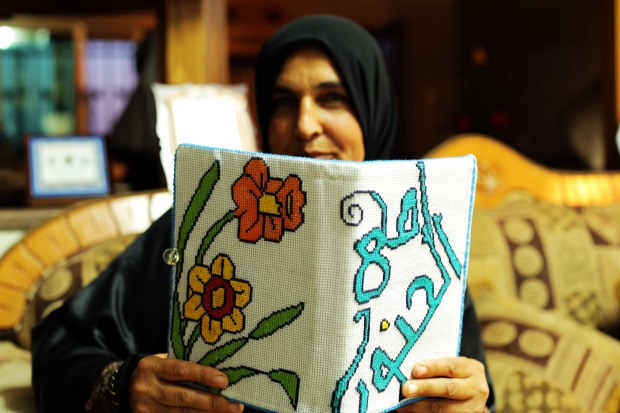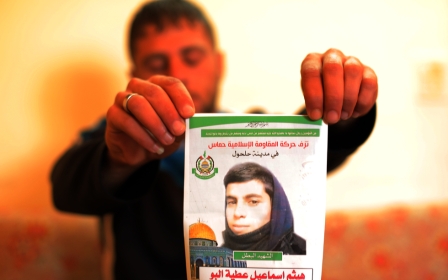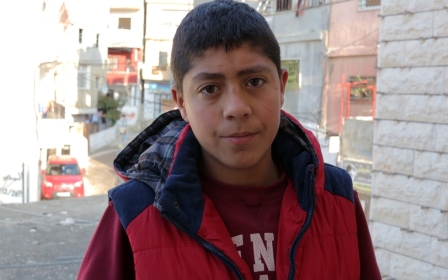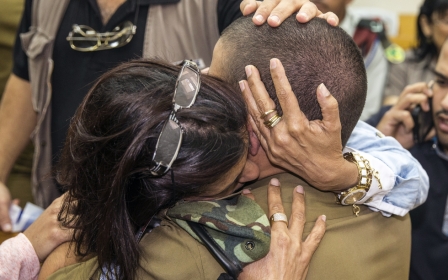Celebrations as Israel frees 'youngest female Palestinian prisoner'
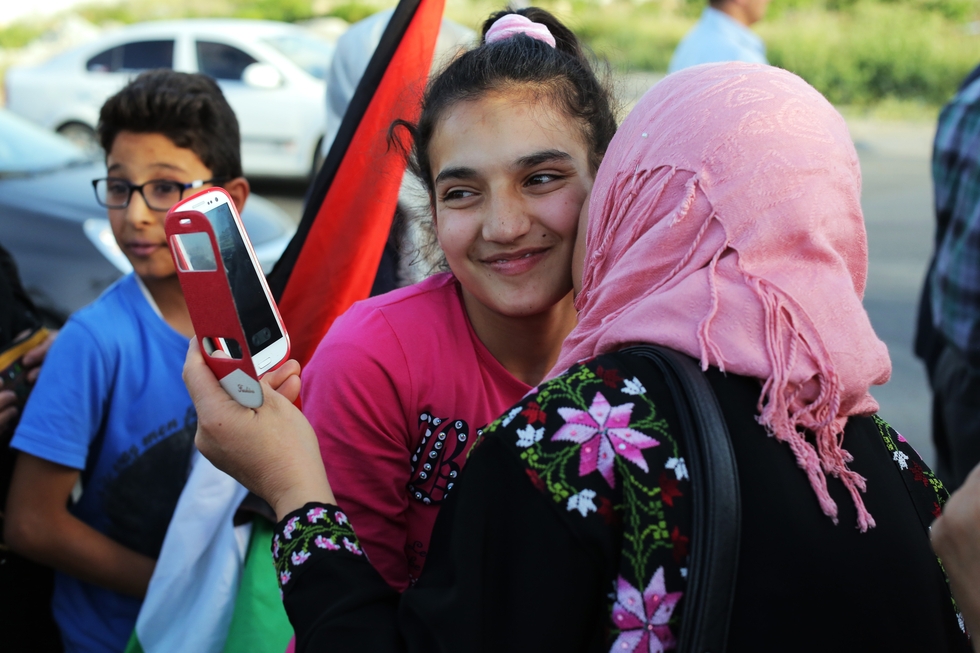
A 12-year-old Palestinian girl has made an emotional return to her hometown in the occupied West Bank after spending more than two months in an Israeli prison on charges of attempted voluntary manslaughter and illegal possession of a knife.
Dima al-Wawi, who is believed to be the youngest female Palestinian ever to be imprisoned by Israel, was originally sentenced to four-and-a-half months in prison as a result of a plea bargain worked out by her lawyers from the children’s rights group Defense for Children International (DCI).
The family were also fined 8,000 shekels ($US2,100), and her father, the family’s sole source of income, was fired from his job in Israel.
Al-Wawi was detained on the morning of 9 February near her hometown of Halhul in the West Bank district of Hebron after being caught at the entrance of the illegal Israeli settlement of Karmei Tzu with a knife in the shirt of her school uniform.
Wearing a bright pink shirt with a flower-patterned headband and a traditional Palestinian scarf draped around her shoulders, al-Wawi was greeted by friends and family as she arrived home on Sunday.
Her older brother Mohammed wept as he embraced her before putting a Palestinian flag in her hand. He then escorted al-Wawi to another car, in which she was driven around the streets, standing up and waving the flag out of the sunroof.
Villagers stood outside markets and homes, waving as dozens of cars joined the convoy in celebration.
“I have never been so happy to see anyone, everyone is so happy to have her home, we might be crying but it is out of happiness,” Mohammed told Middle East Eye, standing on the steps of the family home where hundreds gathered to join the celebrations.
“We were so worried about her. No matter what, prison isn’t a place for a child.”
Under Israeli civilian law, children under the age of 14 cannot be sentenced to time in prison, however, Palestinians in the occupied West Bank are governed by Israeli military law, which allows Palestinian children as young as 12 to be jailed.
Al-Wawi was among at least 438 Palestinian minors currently serving time in Israeli jails, 98 of whom are under 16, according to prisoners' rights group Addameer.
Since the start of the current wave of violence in the occupied West Bank and Israel last October, the number of Palestinian children detained in Israeli prisons has increased sharply.
Only 170 Palestinian children were documented as being held by Israel’s Prison Services in September, according to Israel’s Haaretz newspaper.
Al-Wawi told MEE that she was in prison with several other children including girls aged 13 and 14.
“I wish all the friends I made could be freed, I wish all the children were allowed to come out of the prison with me,” she said in her small bedroom, surrounded by colourful balloons that filled every inch of flooring.
During her stay in prison, al-Wawi attended classes delivered by female Palestinian teachers who are citizens of Israel.
She learned Arabic and traditional Palestinian embroidery from her teachers, and took lessons in English from Khalida Jarrar, a well-known PLO legislative member and human rights activist with the Popular Front for the Liberation of Palestine, who was being held at the same prison.
“I am very grateful to the other Palestinian women who were in the prison with Dima for taking care of her,” her mother Sabha al-Wawi told MEE.
Sabha was only allowed to visit her daughter twice during her 75-day imprisonment. During the visit, physical contact was forbidden.
“Waiting for Dima to be released was the hardest thing I have ever been through,” Sabha said, clutching an embroidered book that reads “Sweetest Mum” in Arabic, made for her by her daughter in prison.
Al-Wawi declined to speak about the day she was arrested, or why she had a knife on her, but Sabha said she thought her daughter was too sensitive to the upheaval surrounding her, without having the maturity to contextualise the issues.
Just three days before being detained, al-Wawi had attended the funeral of 14-year-old Haitham al-Baw, another Halhul youth, who was shot dead in a field at the side of a road by Israeli forces.
“It could have been the funeral that upset her, we let her go to it because it was here in the village,” Sabha explained.
“Before it happened she was also asking a lot of questions about Mohammed al-Qiq,” she added, referring to a Palestinian journalist who reached the brink of death on hunger strike against his detention without charge or trial.
“She was really stuck on al-Qiq, she kept asking what would happen to all his children if he died.”
Sabha said she would talk more to her daughter once things had “calmed down” and she had resumed school.
“I will try to help her understand things. I think she is too young to have to worry about politics, but the occupation already took part of her childhood so it needs to be done,” she said.
Additional reporting by Abed al-Qaisi
New MEE newsletter: Jerusalem Dispatch
Sign up to get the latest insights and analysis on Israel-Palestine, alongside Turkey Unpacked and other MEE newsletters
Middle East Eye delivers independent and unrivalled coverage and analysis of the Middle East, North Africa and beyond. To learn more about republishing this content and the associated fees, please fill out this form. More about MEE can be found here.


